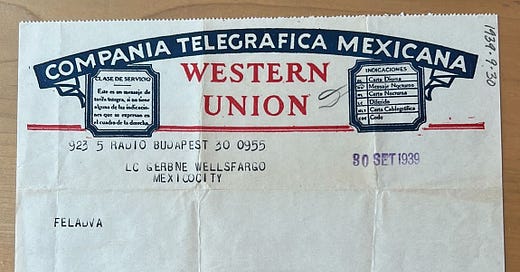What is the difference between út remek volt and utremekvolt?
Technically, they both mean the same thing. Út remek volt means “journey was great,” while utremekvolt translates as “journeywasgreat” — the same words, just without spaces.
And yet, these details matter — though not for the reasons a 21st century person might expect.
We can see why in this June 1939 letter that Árpád sent to Opapa in Mexico :
We are looking forward to your letter (the one you mentioned in your telegram). If you send a telegram again, just to let you know: the post office in Pest divided “utremekvolt” into three words, divided “minden rendben” into two words, and they made us pay 5.60 for blending words. This did not make us unhappy – moreover, I think we saved some money as they left “Mexicocity” as one word.
I love the detail in this passage! It transports me back into the time of telegrams, and shows how people were strategizing about communication. Every single word on a telegram came with a price, and money was scarce. Opapa was broke, and his parents were in debt after borrowing hundreds of dollars (the equivalent of about $10,000 today) to pay for his ticket on the S.S. Flandre.
From Árpád’s letter, we learn that the Gerbners were counting every pengő (ie. the Hungarian currency). Opapa was trying to combine multiple words into one word so that his message was cheaper to send. So he made út remek volt into utremekvolt, and combined minden rendben (“everything is alright”) into mindenrendben. This may have fooled the folks in Mexico, where he sent the telegram, but once it got to Budapest, the post office workers “divided utremekvolt into three words,” and “divided minden rendben into two words,” which cost Árpád extra money. But, there was good news as well — they kept “Mexicocity” as one word, so that “saved some money.”
Aside from the fascinating insight into the world of telegrams, these lines also offer a rare glimpse into what Opapa was writing about his travels. Opapa was assuring his family that he was fine, and telling them not to worry. “Út remek volt,” he wrote, “journey was great.” Given the date — June 8, 1939 — Opapa must have been referring to the journey on the S.S. Flandre. He was making things seem quite a bit rosier than they actually were, given the fact that 104 Jewish refugees on his ship had been denied entry into Cuba, and Opapa was only able to disembark in Mexico thanks to the kindness of a stranger.
“Minden rendben,” he added: “everything is fine.” Everything was not really fine, but Opapa was an upbeat, determined, and confident person who seemed to find his way out of very dicey situations — plus, he knew his family in Budapest had enough to worry about in the summer of 1939.
***
Nuts to crack:
Does anyone know who paid for telegrams? Would it be the sender or the recipient? Or both? Or did it depend? Was there a “Collect Call” version of the telegram, when you could send it for free but the recipient would be expected to pay?
I’m actually not sure how to interpret the telegram receipt (?) that Opapa kept from September 1939 (see image above). Is this what a telegram receipt looks like? Any clue as to what it all means?





My guess on the telegram is that you could send a" collect" telegram which is what Opapa did, but didn't fool the Hungarian workers on the other end. Going back to the kindness of strangers post, do we know why (luckily) Opapa got a ticket to Veracruz not Havana in the first place, and why couldn't some of those who were denied entry to Havana play the extra money and get off on Veracruz if they had the money plus more to show when they disembarked?
Yes, I figured they didn't have visas after I wrote my comment, it was kind of a dumb comment. Opapa was sure lucky he had a visa for Mexico, not Cuba (and mabe so am I and you, Erzsi, Emily, etc, etc.)